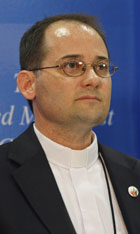Relationships established before the 2008 United Methodist General Conference began helped temper a May 1 response to that body's decision not to change the denomination's current positions on homosexuality, according to some participants.
During a press conference after a "witness" was made on the General Conference floor by supporters of lesbian, bisexual, gay and transgendered people, Bishop Gregory Palmer, president of the United Methodist Council of Bishops, said he had a "deep sense of gratitude" for both how the witness was handled and how delegates and bishops responded.
The 15-minute demonstration was in reaction to the April 30 decision to retain the denomination's decades-old proscription describing homosexual practice as "incompatible with Christian teaching." One protester, Audrey Krumbach, read a statement declaring that the "anti-gay policies of The United Methodist Church are wrong and sinful in the sight of God."
Afterward, 16 bishops met with the witnesses advocating for full inclusion and created a table for Christian conferencing and acknowledgement of the pain felt by some church members. "We went into a time of discussion, speaking from our hearts as much as our heads," said Bishop Sally Dyck.
Team-building eased tension

The Rev. Troy Plummer
The Rev. Troy Plummer, executive director of the Reconciling Ministries Network, noted that "today was a better day than yesterday." He thanked the team from JUSTPEACE, a mission of the church for mediation and conflict transformation, for helping participants in the discussion to "overcome some sticking points."
"In shock" over the outcome of the April 30 vote, Plummer said it was only the team-building which occurred before General Conference that prevented a response of civil disobedience.
Bishop Scott Jones said he had only joined those conversations today as a volunteer for the Council of Bishops, but supported the effort because he has "a ministry of bridge building."
On May 2, the last day of General Conference, those involved in the conversations will focus on how to proceed, according to Dyck. "We do want to build on relationships and trust so we can use this as an opportunity for new hope to emerge," she said.
The Rev. Gail Murphy-Geiss, chair of the Commission on General Conference, addressed the concern over the fact that the demonstration appeared to be cut off from the live Internet feed of that plenary session. "It was definitely an accident," she said. "The plug was not pulled."
Even though it was not shown live, Murphy-Geiss said the event was recorded and has since been uploaded to the General Conference Web site, www.gc2008.umc.org.
Decision 1032 still troubles some
Plummer said that he was most troubled about the vote to let stand language in the Book of Discipline regarding pastoral authority over church membership, even though a majority report of a legislative committee recommended the body change the language to make it clear that pastors and congregations "are to faithfully receive all persons who are willing to affirm our vows of membership."
Controversy has occurred over a 2005 decision by the United Methodist Judicial Council No. 1032 supporting the Rev. Ed Johnson of Virginia who denied membership to a man who was in an openly homosexual relationship. The council reinstated Johnson after he had been placed on involuntary leave by the Virginia Annual (regional) Conference.
"It's very dismaying to leave this General Conference with 1032 still in place. That's a grief for our people," Plummer said, adding that he hoped the new Judicial Council "might somehow be asked to reconsider 1032 again."
Jones said that 1032 and a similar case cited "are in my experience, isolated cases" and he believes that 99 percent of the church does not discriminate in this way.
*Bloom is a United Methodist News Service writer based in New York.
News media contact: Linda Bloom, e-mail: newsdesk@umcom.org.
Phone calls can be made to the General Conference Newsroom in Fort Worth, Texas, at (817) 698-4405 until May 3. Afterward, call United Methodist News Service in Nashville, Tenn., at (615) 742-5470.
Related Articles
General Conference headlines
United Methodists uphold homosexuality stance
Resources
Like what you're reading? Support the ministry of UM News! Your support ensures the latest denominational news, dynamic stories and informative articles will continue to connect our global community. Make a tax-deductible donation at ResourceUMC.org/GiveUMCom.



